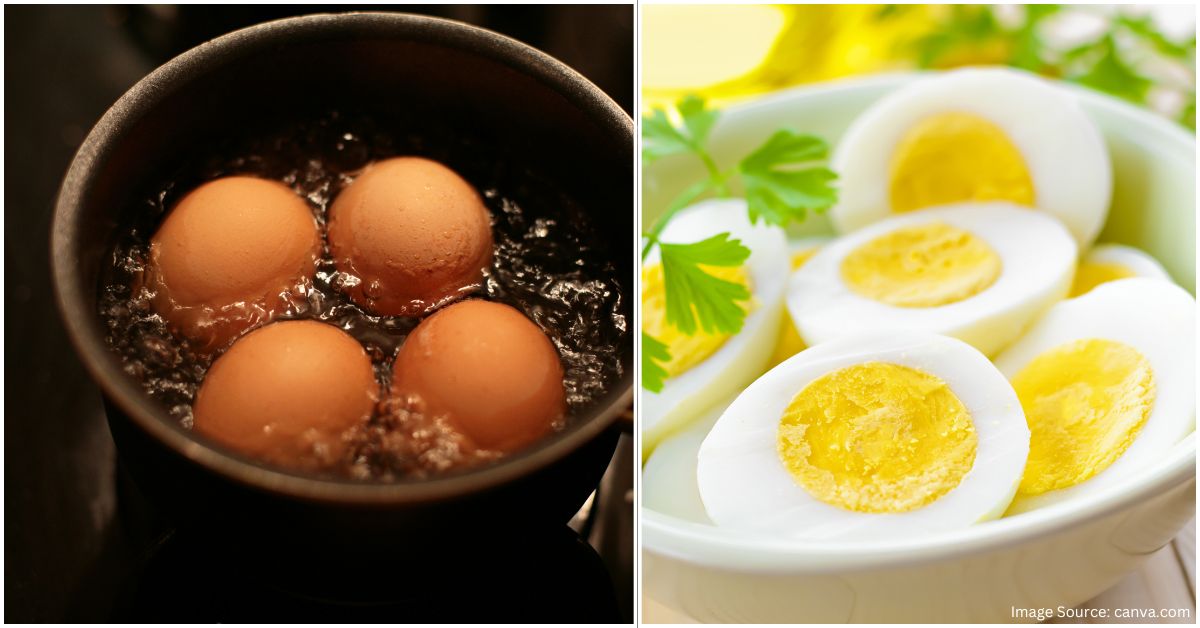Boiling eggs seems simple, but getting them just right can be tricky.
Many people struggle with overcooking, under-cooking, or ending up with a greenish ring around the yolk.
Whether you prefer them soft, medium, or hard-boiled, knowing how to boil eggs perfectly can make a big difference in your meals.
The Common Problem: Imperfect Boiled Eggs
Boiling eggs might sound straightforward, but it’s easy to make mistakes.
Overcooked eggs become rubbery, while under-cooked eggs can be runny and unsafe to eat.
You might also end up with cracked shells or a greenish ring around the yolk, which isn’t very appetizing.
Knowing how to boil eggs perfectly can solve these issues and give you the delicious eggs you want every time.
The Science Behind Boiling Eggs
Understanding the science behind boiling eggs helps you achieve perfect results every time.
The egg white and yolk have different cooking properties, and finding the right balance of time and temperature is key.
Knowing how to boil eggs perfectly involves recognizing the unique composition of eggs and how they react to heat, ensuring the best texture and flavor.
Egg Composition
Eggs consist of the yolk and the white, both of which have different cooking needs. The white solidifies faster than the yolk.
Temperature and Time
The key to how to boil eggs perfectly lies in the balance between temperature and cooking time. Too high a temperature or too long a cooking time can spoil the texture and flavor.
What to Do?
Follow these step-by-step instructions to ensure you know how to boil eggs perfectly.
Step 1: Choose the Right Eggs
Using fresh eggs is important, but slightly older eggs are easier to peel. Fresh eggs might be a bit harder to peel when boiled.
Step 2: Prepare the Eggs
Place the eggs in a single layer at the bottom of a pot. Add enough cold water to cover them by about an inch.
Step 3: Bring to a Boil
Slowly bring the water to a boil over medium heat. This gradual heating helps prevent cracking.
Step 4: Timing is Everything
Once the water reaches a rolling boil, turn off the heat and cover the pot with a lid. Set a timer according to how you like your eggs:
- Soft-boiled: 4-6 minutes
- Medium-boiled: 7-9 minutes
- Hard-boiled: 10-12 minutes
Step 5: Cool the Eggs
When the timer goes off, immediately transfer the eggs to a bowl of ice water. This stops the cooking process and makes the eggs easier to peel.
Step 6: Peel and Enjoy
Gently tap the eggs on a hard surface and roll them to crack the shell.
Start peeling from the larger end where there is usually an air pocket.
Rinse under cool water to remove any remaining shell pieces.
Tips for Perfect Boiled Eggs
Achieving perfectly boiled eggs can be easy with a few simple tips.
Using a pin to prick a hole prevents cracking, while a timer ensures the eggs aren’t overcooked.
Adding a bit of vinegar or salt to the water helps make peeling easier.
These tricks ensure you know how to boil eggs perfectly, leading to consistently delicious results.
Use a Pin to Prevent Cracks
Prick a small hole in the bottom of the eggs with a pin before boiling to prevent cracking.
Use a Timer
Always use a timer to avoid overcooking. Guessing can lead to inconsistent results.
Add a Little Vinegar or Salt
Adding a teaspoon of vinegar or salt to the boiling water can help prevent the eggs from cracking and make them easier to peel.
Conclusion
Learning how to boil eggs perfectly is a valuable skill that can enhance your meals.
Whether you enjoy them soft, medium, or hard-boiled, following these steps will ensure consistent and delicious results.
Perfectly boiled eggs can be enjoyed on their own, in salads, or as a protein-packed snack.
With a little practice, you’ll master the art of boiling eggs and impress your family and friends with your culinary skills.


